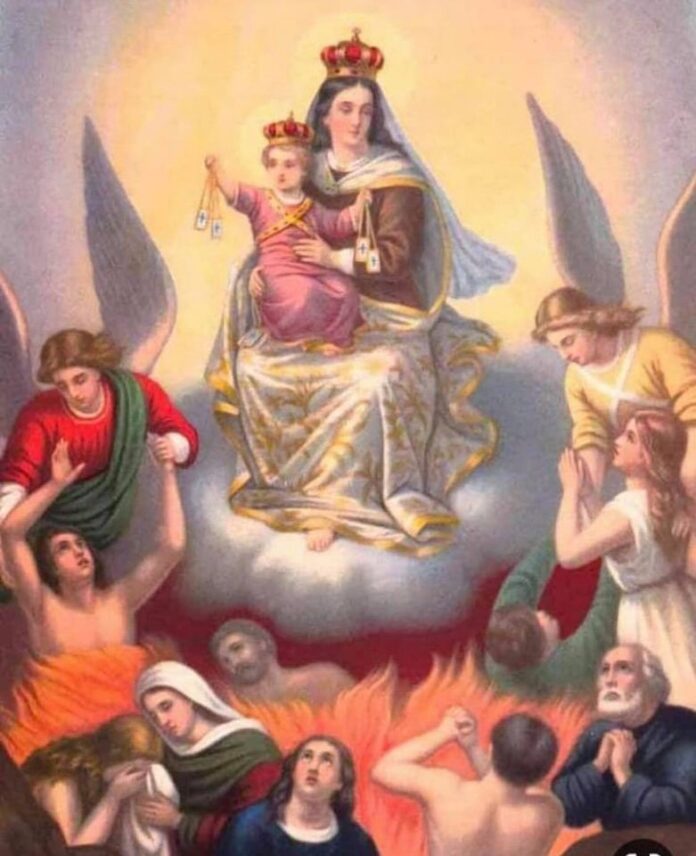Fear is natural to humans – there is nothing wrong in it. Some are afraid of death, some are afraid of poverty. Some are afraid of persecution, insult, isolation and deprivation. Some are afraid of loss of reputation and yet some others are afraid of losing their money. Some are afraid of their enemies. Snakes, wild animals, darkness, heights, depths are all causes of fear. If we are prone to fear, we could find something to fear in everything we see.
But our Lord has said: ‘Fear not’. He has repeated these two words not once or twice. We can see this assurance three hundred and sixty six times in the Bible. So, that is enough for one full year. It doesn’t mean that we are not to fear anybody or anything. Whom should we really fear? Or in other words, whom should we not fear? Jesus Christ has given a plain answer: ‘Do not fear those who kill the body but cannot kill the soul; rather fear him, who can destroy both soul and body in hell’ (Mathew 10:28).
In fact, all those fears we narrated earlier stem from the the one who kill the body. If you are afraid of the guy who can kill your body, then you will start fearing anything and everything. Your only remedy is to stop fearing the one who can kill your body. Instead fear the one who can destroy both soul and body in hell. We call him God. We need to fear Him and Him alone.
But hell….. ! Does it really exist? Isn’t it something symbolic? Is our God so cruel to send someone to an unending period of torment? These and many other similar questions have haunted mankind for centuries. Philosophy and science have failed to give us a definite answer. But the Word of God gives the perfect answer to all our queries regarding hell.
Hell is a reality. Eternal punishment is real. Torments in hell are real. It is a place from where nobody ever returns. Once in hell, always in hell. The good news is that we can escape it. Hell is the work of devil. If it is the work of the devil, then take comfort in what God says; ‘The Son of God was revealed for this purpose, to destroy the works of the devil’ (1 John 3:8). This is why Paul instructs the Romans so emphatically; ‘There is therefore now no condemnation for those who are in Christ Jesus’ ( Rom. 8:1). The one and only sure shot way to escape the condemnation of eternal fire is to be united with Jesus Christ. As Christians we know it. It has been part of our elementary catechism.
Then how come this doubt about the reality of hell? Especially so at this eleventh hour when we are looking forward to the great harvest and the separation of chaff from wheat! To get an answer we should go to the gospel of Mathew. There, we see Jesus teaching his disciples about the nature of the kingdom of heaven. ‘The kingdom of heaven may be compared to someone who sowed good seed in his field; but while everybody was asleep, an enemy came and sowed weeds among the wheat, and then went away. So when the plants came up and bore grain, then the weeds appeared as well’ (Mathew 13: 24-26). Jesus Christ had sowed only one thing; the good seed of the gospel. He expects it to bear fruit thirty- fold, sixty- fold and hundred- fold. Gospel is very clear in its teaching about heaven, hell and the eternal destiny that awaits everyone. Mathew tells us about the great judgement in detail. When he will sit on the throne of his glory, he will separate people from one another. He will reward the righteous with these words; ‘Come, you that are blessed by my Father, inherit the kingdom prepared for you from the foundation of the world’ (Mat.25:34). That is fine. We are too happy to be placed at his right side in expectation of the imminent entry into the kingdom of heaven.
But the Bible says about another unfortunate lot who are condemned as accursed. To them the Son of Man says; ‘You that are accursed, depart from me into the eternal fire prepared for the devil and his angels’ (Mat. 25:41). If we believe that heaven is real, then hell is equally real. In the parable of the rich man and Lazarus, Abraham tells the rich man; ‘Child, remember that during your lifetime you received your good things, and Lazarus in like manner evil things; but now he is comforted here, and you are in agony. Besides all this, between you and us a great a chasm has been fixed, so that those who might want to pass from here to you cannot do so, and no one can cross from there to us’ ( Luke 16: 25-26). This conversation took place when the rich man was undergoing torment in Hades. Two things follow from this parable; first is that it is a place of great torments, where the inmates will long for a drop of water to cool their tongue. It is a place where there would not be any respite from torment and pain. It is the unending nature of the torment that makes hell a place to be afraid of. Second is that there is no chance of escaping from there. To add to their pain they are fully aware of their pathetic condition as also the eternal bliss to which the righteous had entered. If you believe Jesus Christ, then heaven is real and of course hell too.
The Catechism of the Catholic Church defines hell thus: ‘To die in mortal sin without repenting and accepting God’s merciful love means remaining separated from him for ever by our own free choice. This state of definitive self-exclusion from communion with God and the blessed is called “hell.” What follows from this definition is that hell is not thrust upon anybody. It is the natural consequence of a decision taken by man in his free will. He cannot blame anybody for that decision. Our God will be the last person enjoying in sending somebody to hell, because our God is love. But if someone is adamant in denying his communion with God, how can God help him? The scripture says that hell is real. Jesus has on many occasions warned us about hell. The last book of Bible describes hell as a lake that burns with fire and sulfur. ‘But as for the cowardly, the faithless, the polluted, the murderers, the fornicators, the sorcerers, the idolators, and all liars, their place will be in the lake that burns with fire and sulfur, which is the second death’ (Rev.21:8).
Let us return to our question. How did it happen that many people, Christians and Catholics included, do not believe in the reality of hell? This false teaching is a weed sowed by the enemy, devil. And what is his harvest? It is nothing but chaff, because all wheat goes to the eternal barns of Jesus Christ. Be counted with wheat, not chaff. Let those who think that hell doesn’t exist, have a thorough introspection. Somewhere in the past they will see instances when the devil infiltrated their minds with the falsity that hell never existed. It may be through reading books or listening talks or subscribing to certain philosophies.
Many saints and seers were given the opportunity to have a vision of hell. Of them, St Faustina’s visions are worth mentioning. According to her, hell is a place of severe persecution, pain and torment. First and foremost is the despair of having lost the God forever. Second, they suffer from the feeling of guilt. Third, they know that this state will never change. Fourth, the fire of the hell is such that it does not consume the victim but pierces his soul and torment it. Since it originates from the wrath of God, it is unbearably painful. Next comes the darkness and nauseating stench. Though it is dark over there, the souls can see the state of other souls. Their sins as well as the sins of others are displayed before them. Next is the terrible despair, hatred to God, blasphemous utterances and cursing words echoing everywhere. In addition there are particular punishments for each individual according to the gravity of their sins. St Faustina tells us that those parts of the body used for committing sins will be tormented for ever as punishment. She concludes that the purpose of writing these in detail is to give testimony to its reality so that nobody should deny it.
In her own words, what she was allowed to see was only a pale image of hell. We could imagine how terrible its actual sight will be. One thing which she writes for our benefit is that most of the souls she saw there were of men who denied the existence of hell! Understand that hell does exist. Do not be fooled by the false prophets who proclaim that everybody will go to heaven. Do not be gullible to believe that while good souls go to heaven, bad souls simply vanish or cease to exist. Please do not spend your time and energy in studying about hell. It is of no use. Instead we better use that time and efforts to save ourselves from the eternal torments of that damned place.
While going through this article, naturally a doubt will arise in the minds of many. What is the need of telling so much about hell? We are on a pilgrimage to heaven. Why should we unnecessarily bother ourselves with the thought of hell? Isn’t it enough to preach about the good things in the gospel of which heaven is the most important?
I would explain it this way. If you are a doctor and suppose a patient who is in urgent need of a surgery is brought to you. Will you not tell the patient about the need of the surgery? Or will you leave him to die without performing the surgery? Surgery is always painful, but it is for a future good. In the same way hearing about hell is painful for some, but it is for saving his soul from eternal punishment. Jesus never shied away from telling about hell. He didn’t mince words while describing the darkness and unquenchable fire of the eternal prison. He warned us that it is a place made horrible with weeping and gnashing of teeth in terrible pain and despair!
St Ignatius of Loyola used to say that the best gospel preaching is the one about hell. Talks about virtues, Divine love, Divine mercy, eternal bliss and the like will not pierce the hardened hearts of sinners. But a passing remark about hell where they should go after death, would convert many of them. It was his experience. St Therese of Avila used to tell her sister nuns to visit hell in spirit even while they were alive so as to avoid going there after death!
Nowadays we hear a lot about Divine Mercy. How can a merciful God send somebody to hell for all eternity? The answer lies in the very nature of hell. God never sends anybody to hell. It is the voluntary decision of each individual to reject God and thereby selecting hell as his eternal destiny. Mercy is excluded from hell. In other words, those who are thrown into the hell cannot repent, nor is there any use of them repenting. Unlike the prayers for the souls in purgatory, our prayers or intercession from saints are of no avail to them. Certain people believe that there is nothing like hell and the souls of ‘bad’ people cease to exist or simply disappear. If we buy this argument, it means that there is an end to the torments of hell, which is against what the scripture teaches us. St Gregory describes it in these words; ‘It is an unending death. Before it comes to an end, it will commence again. As for its end, it never ends’.
St Augustine says; ‘We cannot say that the soul has a ‘life’ in hell. Because that soul cannot in anyway participate in the light of Divine life. There the body is subjected to all kinds of torments. So this ‘second death’ is more cruel than the first. It is without end’. In ‘Divine Comedy’ Dante wrote about the gate of this place where it was inscribed:
“Through me the way is to the city dolent;
Through me the way is to eternal dole;
Through me the way among the people lost.
All hope abandon, ye who enter in!”
It is a place where all hopes are abandoned. Then another question arises. Where is this place located? Frankly, nobody knows. Many theologians like Gregory the Great, Thomas Aquinas and Swaras have expressed their personal opinions in this regard. Some postulate that hell is located at the innermost parts of earth. We don’t know it nor does the Church teaches us anything about its location. It is wise to follow what St John Chrysostam said; “It is immaterial to know the location of hell. What is important is a firm decision that we will never fall into it one day’.
Anybody who denies the existence of devil is, no doubt, an agent of devil. Similarly anybody who denies the reality of hell, is certainly an agent of hell. Blessed are those who flee from such false teachings. What all we need to know about hell is written in the Scripture. There is nothing to be added to it nor anything to be removed from it. Hell is a place of eternal torment. We do not know how horrible it is. But God knows it. This is the reason why the Son of God offered his very life for our salvation. He didn’t want any of his sheep to be lost. ‘When I was with them, I protected them in your name that you have given me. I guarded them, and not one of them was lost except the one destined to be lost so that the scripture might be fulfilled ( John 17:12). Because he knew what awaits a man in hell, Jesus washed the feet of even the one destined to be lost and gave him the bread of life as a last attempt to redeem him. But he had already made up his mind to eternally separate him from God. It is this pain of losing a human soul that made Jesus to say: “It would have been better for that one not to have been born” (Mathew 26:25).
Our Saviour is ever ready to redeem us irrespective of the gravity of our sins. But he needs our ‘Yes’. Time is running out and the path to hell is getting broader every day. Say ‘Yes’ right now and return to Jesus Christ. He will place us firmly in the narrow path to eternal bliss. Remember that most of the inmates of hell never believed that there is a place called hell.
Let me conclude by reminding all of our duty to pray for those who travel the fast track to perdition without looking at the Lord, who is waiting for them till the very last moment. It is an act of mercy for which God will reward us.




















